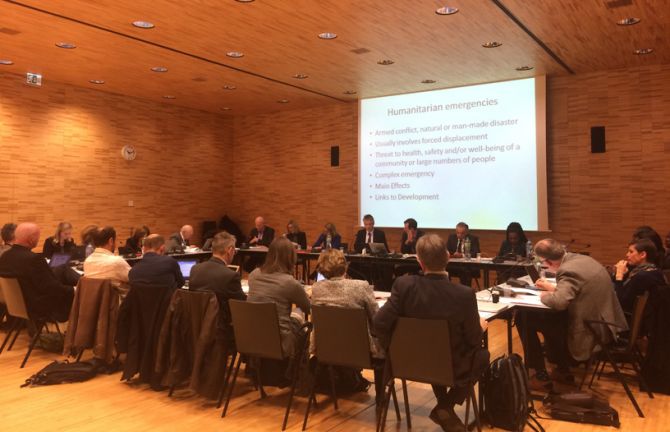

Update
HIV and humanitarian emergencies
04 March 2015
04 March 2015 04 March 2015Addressing the needs of the millions of people around the world affected by humanitarian emergencies will be critical to ending the AIDS epidemic by 2030, top experts agreed at a meeting held in Geneva, Switzerland, on 3 March.
Calling for a new way of addressing HIV in humanitarian emergencies, the experts examined ways to ensure that the specific needs of people affected by humanitarian emergencies are taken in to account as the response to HIV is fast-tracked over the next five years.
At the end of 2013, there were more than 51 million people worldwide who had been forcibly displaced, the highest number since the end of the Second World War. Many others facing humanitarian disasters remain at home but suddenly find themselves in fragile environments.
The links between HIV and humanitarian emergencies are complex. Vulnerability to the virus can be heightened because of, for example, greater exposure to sexual violence and more reliance on transactional sex to meet basic needs. In addition, health services and HIV intervention programmes may become much harder to access or even nonexistent.
The experts at the meeting, which was co-hosted by UNAIDS, the Office of the United Nations High Commissioner for Refugees and the World Food Programme, shared the latest evidence-informed insights, knowledge, experiences and data that support the inclusion of people affected by humanitarian emergencies in HIV programmes. These will be key elements for the upcoming 36th meeting of the UNAIDS Programme Coordinating Board in July 2015 which will have a special focus on HIV in emergency contexts.
Specific areas discussed included: obstacles to HIV programming in emergencies; identifying gaps and how to address them; coordination arrangements between different agencies; improving adherence to treatment; and tailoring HIV-related programmes to address a range of differing types of emergency.
Quotes
"Humanitarian emergencies present contexts of fragility, vulnerability and uncertainties. These are fertile contexts for HIV transmission. Addressing HIV in emergencies is not a matter of choice but rather a human rights issue. Populations affected by humanitarian emergencies must be central to the goal of ending AIDS. Innovation is key to achieving this outcome"
“We cannot end the AIDS epidemic by 2030 if we do not provide protection, care and treatment to people affected by emergencies. It is a matter of public health for people displaced by emergencies and those that host them. It is a basic human right. I believe finally there is the political will among the international community to address this issue.”
“With so much progress that has been made fighting the HIV epidemic, the need to prepare to maintain HIV support during emergencies and disasters is now more important than ever.”
“We are pleased to see the increasing focus on HIV in humanitarian emergencies, where risk and vulnerability to HIV is often increased. In particular, there is an urgent need to ensure the continuity of HIV prevention and treatment services for people living with and at risk of HIV in fragile and conflict affected states and during emergencies.”



